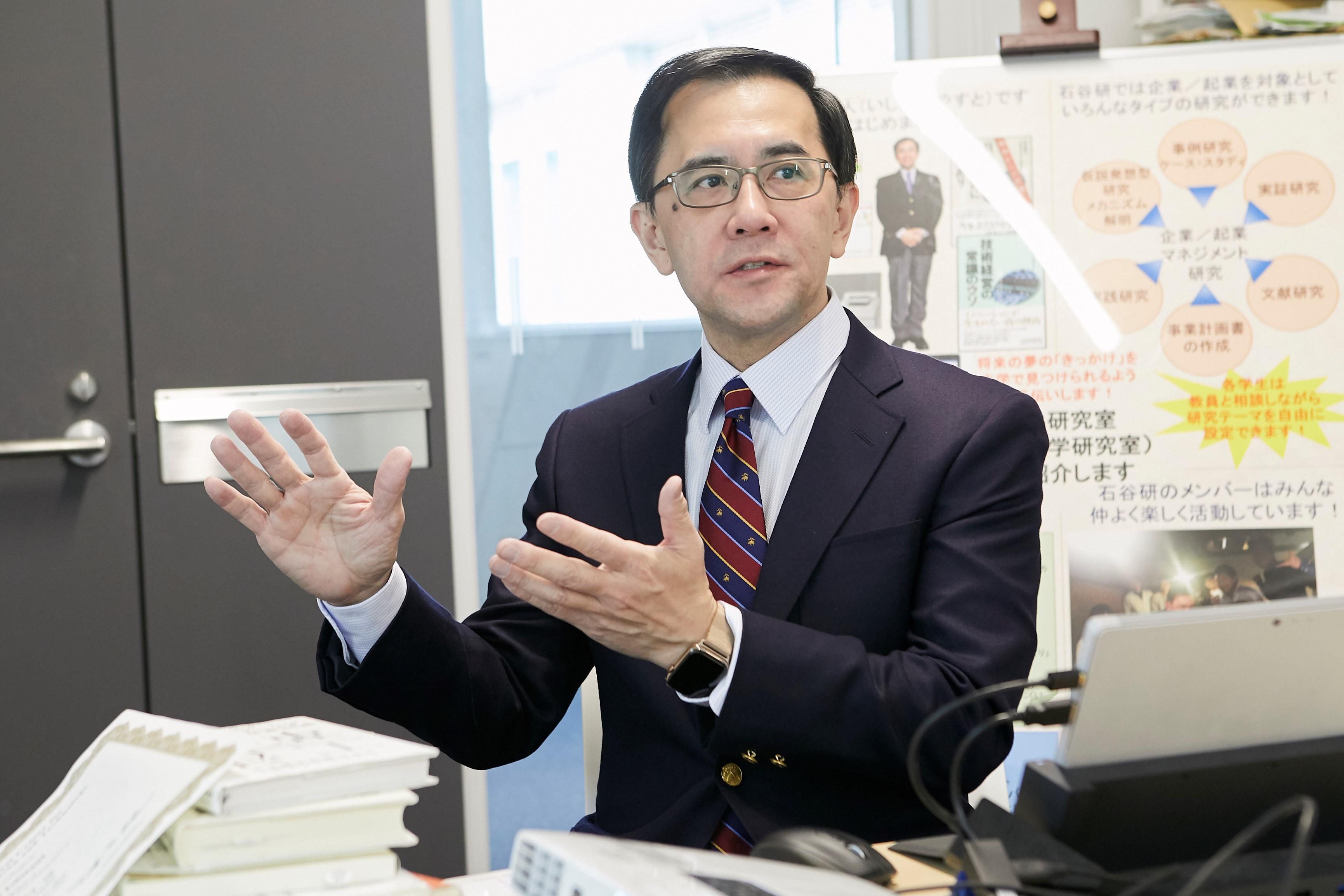- TOP
- Cutting-edge Research and Social Contribution
- Cutting-edge Research
- Finding the mechanism: how entrepreneur identity leads to results

Finding the mechanism: how entrepreneur identity leads to results

ISHITANI Yasuto
- Specialized field
Entrepreneurship, innovation theory, technology management theory, management strategy theory
One indicator for entrepreneur success
Developing countries have begun to absorb Japan's manufacturing technology, and as global competition intensifies, Japan's manufacturing industry has been experiencing difficulty in every sector. Under those circumstances, in recent years there has been a growing interest in niche top companies that manufacture highly independent products and supply competitive original goods. A niche top company is a company that has created a small market of its own and has a high market share with extremely high competitiveness at home and abroad. One of the characteristics of these companies is that their high value-added products are realized by means of deep, strong client relations.
The origin of such companies can be traced back to the entrepreneurs who originally set up the business. An entrepreneur's identity begins to be shared among employees in the organization, then becomes the identity of the entire organization, and eventually becomes the driving force behind organizational product development and business creation.
Associate Professor Ishitani explains, "Corporate identity is a common understanding among corporate players by which they define their uniqueness, characteristics, strengths and ideal form. Business philosophy is often similar across companies but it has been found that the identity of a successful company is more distinct than its philosophy."
Recent research on entrepreneurship (particularly entrepreneurial spirit and activity) suggests that there is a strong link between entrepreneur identity and entrepreneurial activity and results. However, that research has not elucidated the overall picture in terms of detailed, concrete examples of the formation of entrepreneur identity, execution of entrepreneurial activities, performance, establishment of competitive advantage, and entrepreneurial proficiency.
Dr. Ishitani continues, "It is said that if there is a shared identity within the organization, the unity created among the employees supports the execution of the organization's strategy. However, the process or mechanism by which an entrepreneur's identity impacts on the execution of the strategy and achievement of results has not yet been empirically elucidated. However, that is what those who are aiming to be entrepreneurs are most eager to know."
How does entrepreneurial identity support strategy practice and lead to competitive advantage? Dr. Ishitani, who is keenly interested in this point, focuses his research on some niche top companies in Kochi Prefecture who have achieved competitive advantage both at home and abroad. He is working to elucidate the mechanism by which an entrepreneur's identity leads the company to take action, achieve results and develop expertise.
"In recent years, one serious issue is the absolutely small number of people in Japan who take on start ups in business. What sort of qualities are needed to become an entrepreneur who brings employment and innovation and creates growth? To answer this question, which seems as yet unanswered, is one of the main objectives of my research."
Using a unique theoretical model to analyze entrepreneurs' stories
There are many unique niche top companies in Kochi Prefecture, for example: YAMAKIN Co., Ltd., which has a domestic share of 35% or more in the field of precious metals alloys for use in porcelain materials for dental prostheses; MIROKU Corporation, which accounts for 70% of domestic production in the field of hunting guns; and Kanematsu Engineering Co., Ltd., which tops the environmental maintenance equipment sector with its powerful suction work vehicles, capturing more than 80% of market share.
By elucidating the causal mechanism underlying growth related success of such niche top companies, Dr. Ishitani hopes to elucidate the specific knowledge requisite for niche top performance; the results should be useful not only for entrepreneurs but also for existing small and medium enterprise and venture companies.
In order to represent the overall situation of each entrepreneur in a more understandable form, Dr. Ishitani adopted a method based on self-storytelling theory and process tracking. He conducted interviews with entrepreneurs to draw out their histories and thinking; then, he organized these stories in chronological order to create a detailed description of the process from identity formation to niche top achievement.
Dr. Ishitani elaborates, "As I engage repeatedly in dialogues with the entrepreneurs, I elicit not only positive stories from the entrepreneurs, but also anecdotes with negative and inactive aspects, things that are hard to capture. The collection of rich and convincing anecdotes enabled us to conduct our analysis from various angles."
Furthermore, in order to analyze the stories of entrepreneurs and eventually elucidate the mechanism of success, growth, and expertise in terms of entrepreneur identity, Dr. Ishitani developed a new theoretical framework called the entrepreneur self theory.
That new theory is derived from the theory of social behaviorism, a prominent and pioneering theory advocated by American social psychologist G.H. Mead. Mead says in the theory that the human self is socially constituted by communication with others by means of significant symbols, and that the human self consists of dual aspects, me and I. Similarly, in his entrepreneur self theory, an entrepreneur's ego also consists of two aspects, me (entrepreneurial identity) and I, and it establishes communication with others (competitors, buyers, sellers) in the market using a business model as a signifying symbol. His extension of Mead's concept has been successful as a natural form.
Dr. Ishitani adds, "By substituting entrepreneurs for individuals in the theory of social behaviorism and extending them independently, we constructed a new model, entrepreneur self theory. Then, applying the model to the stories of entrepreneurs in niche top companies, we analyzed the dynamics of entrepreneur self in detail."
Those entrepreneurs started their companies in Kochi Prefecture and grew them there. Dr. Ishitani applied his entrepreneur self theory to the stories they told him. He achieved a full characterization of the mechanism by which those entrepreneurs communicate with the market, form their identities, carry out entrepreneurial activities and gain expertise, all through empirical learning with reflection.
In this approach, the researcher-listener is proactively involved in casting the stories of entrepreneurs and conducting revolutionary analysis based on the newly constructed theory. There is no precedent for this research approach.
In response to the widely held notion that identity and strategy are definitely related but the processes and mechanisms underlying their close connection are as yet not clarified, Dr. Ishitani elucidated a tight relationship between the two through analysis of individual cases. Recently, his results have been well received: his papers have been published in a number of domestic journals.
Real engineering experience as the driving force of research
Although Dr. Ishitani has a steady stream of achievements as a researcher in the field of management, he used to be an engineer. His experience is unique: he was long involved in technology development applying artificial intelligence in hid work for a major electronics manufacturer.
"In my days as an engineer, conducting research every day, I dreamed about innovation that changes society, but after experiencing a setback, I changed my direction to the course I'm following. With my experience of dreams not coming true, I am constantly interested in entrepreneurs and innovations. Starting from consideration of why I failed to become an entrepreneur, I was led to the fascinating work of figuring out how talented entrepreneurs think, act and innovate."
During his engineering days, Dr. Ishitani worked on the development of character recognition and document analysis technology. He has found that though engineering and business studies appear completely different, the basics of their thinking and methodology are similar.
"Originally I was very interested in how intelligence worked in the human mind. When I was an engineer, I was writing programs to introduce artificial intelligence technology to elucidate those processes. My current field is basically the same. Observing in detail the processes by which entrepreneurs plan strategies and practice them somehow has a lot in common with the work I did when I was an engineer. It is analogous to the process of figuring out how humans read written words."
It seems that Dr. Ishitani had a natural change of direction from engineering to business studies. His experience as an engineer must have been a great impetus to his research.
Dr. Ishitani concludes, "This research theme, the connection between identity formation and strategic practice, is now considered to be the leading issue in the field of business studies. Towards a future when the research results will be used by many people, we can foster eminent entrepreneurs and generate valuable innovation, I will tackle these challenging issues using unique methods."
